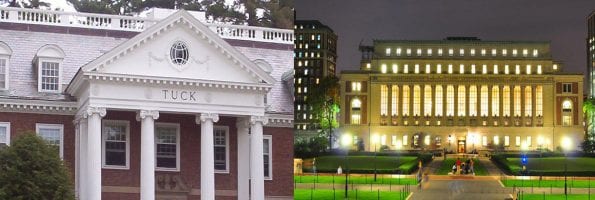Friday News Roundup – Harvard Online Expanding and Joshua Harris Giving Back to Wharton

Let’s take a look at some of the biggest stories from this week, including Harvard Online expanding its program.
Wharton School Receives $10 Million Gift from Josh and Marjorie Harris – Wharton News
The Wharton School of the University of Pennsylvania recently announced a major gift that will strengthen the school’s programming in alternative investments.
The Joshua J. Harris Alternative Investments Program brings students, faculty, and leaders in the industry together to explore the latest advancements in hedge fund management, private equity, investment management, and venture capital. Named for 1986 grad Joshua Harris and his wife, Marjorie, the donation of $10 million will not only enhance the curriculum, but will also enable Wharton to sponsor multiple events on the latest developments in this class of investing.
“The Harris’ extraordinary gift … will significantly expand student opportunities, advance new knowledge, and meaningfully engage the University community, which are key priorities for Penn,” says University President Amy Gutmann.
Josh and Marjorie Harris are also founders of the Wharton Private Equity Professorship, and Josh is a member of Wharton’s Board of Overseers. The couple’s support of the school extends also to endowments for scholarships and Penn athletics. Josh Harris is founder of Apollo Global Management, a worldwide leader in alternative investment. His business ventures have brought him to the world of sports management. Currently, Josh is a majority owner of the nearby Philadelphia 76ers and the NHL’s New Jersey Devils. He is also a current minority owner of Crystal Palace in the EPL.
Of his involvement at the school, Harris says:
“I know first-hand that Wharton students are creative, entrepreneurial, and eager for new challenges—attributes that the great leaders of the industry possess. I look forward to the Harris Program inspiring our students to pursue transformative opportunities and develop into future leaders of the industry.”
You can read more about the Harris family’s donation here.
The Future of Healthcare Symposium – Pepperdine News
On March 21, 2019, the Pepperdine Graziadio School will host its 5th Annual Future of Healthcare Symposium, which will address the growing presence of artificial intelligence and smart machines in healthcare delivery systems.
Keynote speakers are Jeff Stibel, Ph.D., author, USA Today columnist and Vice Chairperson of Dun & Bradstreet; and Professor Eric Topol, MD, Founder and Director of The Scripps Translational Science Institute and Executive Vice President of The Scripps Research Institute.
Dr. Stibel received an honorary doctorate from Graziadio, and is also the recipient of a brain and behavior fellowship from Brown University. His company, BrainGate, has employed AI to treat neurological disorders. Stibel is also a thought leader on methods of keeping the brain healthy in the digital age.
Dr. Topol’s presentation, Deep Medicine: How Artificial Intelligence Can Make Healthcare Human Again, will examine the ways in which smart technology can humanize medical treatments as opposed to distancing patients from their caregivers. He will also explore genomics and digital medicine in the training of medical staff.
Panelists will discuss the ways in which technologies such as AI have enhanced patient experience while improving business models at various organizations.
For more on the symposium, click here, and check out some highlights of last year’s event below.
Harvard Business School Online Announces Two New Courses, Leadership Principles and Global Business – Harvard Newsroom
Harvard Business School online will offer two new courses this spring, expanding choices for those who pursue the degree as they advance their careers.
The new Leadership Principles course aims to give students practice in developing a leadership style, or in honing an existing style for the best workplace outcomes. Students will have the opportunity to interact with their peers via case studies and presentations during this course.
In the Global Business course, professors who are also heads of global organizations will address macroeconomic indicators and the power of effective public policy.
Patrick Mullane, Executive Director of Harvard Business School Online, says of the new offerings:
“We’re pleased to offer these new courses to help leaders better drive their businesses and propel their careers during volatile times … Professors Joshua Margolis and Tony Mayo are extraordinary faculty who will instill confidence and strengthen leadership capabilities for professionals ready to take the next step. Forest Reinhardt is a world-class economist who will equip participants with the tools they need to anticipate and capitalize on global developments.”
Visit Harvard’s online course guide for more info on cost, dates, and program details.
Findings: Should I Extend My Brand? – Tuck News
Kevin Lane Keller, the E.B. Osborn Professor of Marketing at Dartmouth College’s Tuck School of Business recently shared some knowledge on the concept of ‘brand stretching,’ in which companies known for one exceptionally popular product decide to diversify. His research was recently featured on Tuck’s news page.
Levis, for example, once attempted to launch a line of three-piece suits. Which, rather predictably, did not sell. The suit concept was too far a departure for consumers that were accustomed to Levis jeans. The company then launched Levis Cotton Dockers, which (for better or for worse) became such a huge-seller that Levis was able to drop their name from the brand now known simply as “Dockers.”

After the commercial disappointment of Levis’ ill-fated three-piece suit concept, the jean manufacturer learned the hard way that consumers do not typically respond well to major aesthetic departures.
Keller’s theory is that company’s can expand best into new product lines with small incremental steps.
“By introducing a series of closely related but increasingly distant extensions, brands can enter product categories that would have been much more difficult, or perhaps even impossible, to enter directly,” Keller notes. Another example of this is Crayola, which was known at one time for just crayons, but which then expanded ultimately to become the leading brand for kids’ craft-based products of all types.
This kind of brand expansion takes time, Keller cautions, and companies should be wary of expecting success at the outset of any new product venture. He offers three distinct elements for brand stretch success. An expansion must be desirable from a consumer standpoint, differentiated from a competitive standpoint, and deliverable from the company standpoint.
Keller points out the fact that most new products fail, so developer are wise to focus on the ‘differentiation’ part of brand expansion.
Double Victory for MBA Teams at UCLA Energy Competition – Haas Newsroom
Teams from Berkeley Haas School of Business recently earned both first and second place in UCLA’s 6th Annual Challenges in Energy Case Competition on February 8-10, 2019.
The teams were faced with the challenge of how to monetize the state of California’s race toward electric transit, particularly in light of the 2028 Olympic Games coming to Los Angeles. The teams were allowed to be involved at any part of the product supply chain, and they were allowed to model themselves as either new or existing companies.
The LA Cleantech Incubator is collaborating with local government and business, including the electric utility SoCal Edison to surpass the city’s goal by 25 percent for use of electricity for transportation. The first place team, Team Vinculara, proposed a blockchain-based platform that would aid in distributing low carbon fuel standard credits to owners of electric vehicle fleets.
Second place Team Metromile proposed combining Metromile’s (California’s pay per-mile auto insurance program) with a cash advance to encourage use of electric vehicles, while pushing the company to become the preferred provider of auto insurance.
“All the teams worked really hard and we were honored to be chosen as finalists … When the judges announced that both first and second teams went to Haas, I felt especially proud to share the stage with my classmates,” says CiCi Saekow of Team Metromile.
For the full press release, visit Berkeley Haas’ website.
School v. School: Dartmouth Tuck or Columbia Business School?

It’s tough enough to decide exactly where and what you want to study. But when prospective b-schoolers begin to weigh less tangible but equally important factors like reputation, alumni network, and return on investment, that’s when the MBA selection process really becomes daunting. This is especially true when you size up two MBA programs of comparable stature.
We’d also argue that’s where the process becomes interesting. So don’t fret! Let our School v. School series to do some of the heavy lifting for you. See below for our blow-by-blow comparison of two reigning champions of business education: Dartmouth’s Tuck School of Business and Columbia Business School.
Dartmouth or Columbia: What is Right for You?
Dartmouth College Tuck School of Business
Tucked … away in a small, rural campus in Hanover, New Hampshire, the Tuck School of Business boasts a tight-knit student body and an intimate setting. Over half its student body lives in campus housing, and MBAs belong to small group study teams that convene at the start of their programs.
Tuck consistently ranks among the top business schools in the country. U.S. News and World Report ranks Tuck 8th in management and 10th overall. Tuck offers a traditional full-time, two-year MBA with a variety of concentrations, as well as several short-term executive education programs.
Why Tuck?
- The Advanced Management Program offers “a transformative experience for senior business leaders who seek to innovate, drive growth, and create value.” The Minority Business Programs focus on guiding business owners as they “adjust their strategy, refine their operations, and build their enterprises to scale.”
- Additionally, Tuck offers two programs designed for non-traditional b-schoolers: the Business Bridge Program is a four-week intensive mini-MBA program for liberal arts students. Next Step is two-week program for military veterans and former athletes.
- Tuck is known for its community, with a focus on personal connections, including self-initiated interviews, accessible faculty, and a generous alumni network.
What Is Missing?
- The opportunities that come packaged with a major city and business hub are missing from Tuck’s rural setting.
- While Tuck’s tuition is roughly $5,000 more than Columbia’s, its total costs are $110,173—over $1,200 more than Columbia’s per year.
Tuck vs. Columbia MBA Rankings
| Publication | Tuck School of Business | Columbia Business School |
|---|---|---|
| U.S. News & World Report | 10 | 9 |
| The Economist (Global) | 12 | 11 |
| Financial Times (Global) | 15 | 9 |
| Forbes | 5 | 6 |
| Bloomberg Businessweek | 19 | 7 |
Columbia Business School
Located in the heart of New York City, Columbia Business School—like Tuck—is one of the oldest in the country. Unlike Tuck, Columbia students are in immediate proximity to highly coveted networking, partnership, and placement opportunities of a global business hub.
Columbia’s Programs
Columbia also routinely ranks among the top b-schools in the country—10th in management and 9th overall. Columbia also offers a full-time two-year MBA with various concentrations, Executive MBA, Doctoral Program, an accelerated MBA, multiple Masters of Science options and Executive Education Programs.
Why Columbia?
- The Executive MBA Program offers a traditional MBA program but on a schedule that accommodates full-time employment.
- The Doctoral Program offers a Ph.D. in multiple disciplines and “prepares individuals who have a deep interest in shaping the business research and policy of tomorrow through academic research.”
- First-year students can apply for admittance into the Value Investing Program where they learn to identify, value, research and manage investments.
What Is Missing?
- Columbia is reported to have an intimidating 17 percent acceptance rate—compared to Tuck’s ever-so-slightly more accessible 23 percent
- Only 18 percent of Columbia’s faculty members identify as women, compared to 23 percent at Tuck—both reflect a shamefully low national statistic.
Tuck vs. Columbia MBA Cost Per Year
| Dartmouth Tuck School of Business | Columbia Business School | |
|---|---|---|
| Tuiton | $72,150 | $67,532 |
| Full-Cost | $110,173 | $97,580 |
Both MBA programs are among the most elite in the country, and offer some pretty appeasing salary possibilities.
Tuck vs. Columbia MBA Salary
| Tuck School of Business | Columbia Business School | |
|---|---|---|
| MBA Graduate Salary Range (2018) | $60,000-$215,000 | $52,000– $308,000 |
| MBA Graduate Median Base Salary (2018) | $130,000 | $130,000 |
With comparable tuitions, post-graduate salaries, and employment rates, they contrast most when it comes to class size. While Tuck promises a secluded and intimate B-school setting, it’s tough to beat Columbia’s location in a global financial capital.
For additional insight, be sure to check out the news at both Tuck and Columbia.
3 Essential MBA Essay Question Tips

For many applicants, the MBA essay question is the single most terrifying and challenging part of the entire MBA application. More than your GMAT, GPA, or resume, the essay is extremely personal. The admissions committee uses it to get to know who you are, what you want, and how you’ll fit. And that’s a lot of pressure.
To succeed in your MBA essay, you have to know who you are well enough to paint a comprehensive picture that the admissions committee will keep reading until the last word. You want your story to be interesting, to answer the essay prompts, and to demonstrate “why you.”
And though every school has different MBA essay prompts, three essential elements are always vital. Continue reading…
H-1B Visa Challenges and Post-MBA Industry Employment Outlook

Immigration is in a precarious place in the United States. While media tend to focus on asylum and family separation, the Trump administration has taken aim at the H-1B Visa program. As Clear Admit previously outlined, the H-1B is necessary for any foreign-born individuals who want to work in the United States. Part of the Trump administration’s “America First” policy, the increased attention given to this visa program has created multiple issues for international students and the businesses that hire them.
The first issue that most international MBAs who want to work in the United States will face is the lack of companies who are interested in hiring them. According to the 2018 GMAC Corporate Recruiters Survey, only 47 percent—down from 55 percent in 2017—of all companies surveyed in the United States intended to hiring international candidates. Students interested in working in finance, health care, manufacturing, and nonprofit sectors may want to change their plans as these are the sectors least likely to hire internationals. Only 11 percent of health care firms surveyed said they plan to hire international candidates in 2018, while 14 percent were willing, but had no plans. Seventy-five percent—the highest among the reporting industries—said they would not hire international personnel. Seventy-two percent of non-profit/government agencies and 60 percent of manufacturing companies also responded that they would not be hiring international candidates. The best sectors for international graduates are consulting and technology. Thirty-seven and 39 percent, relatively, reported that they plan to hire international candidates. Over a quarter of companies in both industries reported that they would be willing to hire internationally, but did not have concrete plans to do so.

The reason that it is so hard for international MBA graduates is the nature of the H-1B visa process. If an employer chooses an international graduate and is willing to sponsor their application, neither the firm nor the employee can be sure that the employee will be chosen for the visa lottery.
A current international first-year student at Dartmouth’s Tuck School of Business tells Clear Admit that they haven’t second-guessed their decision to attend a U.S. school:
“I do think about visas, but I am not worried. I look at my MBA from a top school as a long-term investment. I am confident it will deliver returns in many ways throughout my future. My advice to other international students is 1) know why you want the MBA and how precisely you want to utilize it before arriving to school and 2) complete the company research and practice to be extra prepared for recruiting.”
The number of international job-seekers in the United States has declined over the last two years from its peak of 236,000 in 2016. However, the number of applicants for H-1B visas remains high—190,000 people applied for 85,000 H1-B visas in 2018, filling the slots in five days, according to a U.S. Citizenship and Immigrant Services (USCIS) survey.
In addition to the small number of slots, applicants have to deal with the fact that USCIS has increased discretion over how visas are distributed. Although they are generally three years in length, H-1B visas under Trump’s USCIS have been of increasingly bizarre lengths. As noted in the lawsuit, ITServe Alliance v. USCIS, USCIS has issued visas that last one day and 12 days. One specific visa was expired for three weeks before it was received by the recipient. This has led to increased uncertainty around international MBA students getting the cover that they need to work in the United States.
If an international MBA student has received their three-year H-1B visa and has their desired position, he or she might run into difficulty being with their loved ones in the United States. H-1B holders can bring their partners over to stay with them on an H-4 visa while they wait for permanent residency; however, the Trump administration has spoken openly about eliminating this program. While legislation has been proffered to ensure that this program stays in place, the legislation’s chances of becoming law are slim to nil.
Although the current situation is grim, there are efforts being made to improve the situation. Tech firms, a primary beneficiary of the H-1B visa program, have been lobbying Congress to increase the 85,000-person cap for the visas. In addition, there is support among both parties in Congress to ensure that the H-4 program stays in place.
However, this might be too little, too late. These various difficulties have caused a decline in the number of international applicants at U.S.-based MBA programs. According to the GMAC 2018 Application Trends Survey Report, in the two years of the Trump administration, the number of international applicants to full-time MBA programs has decreased 13 percent.
With the system as it is oriented now, being an international MBA student will remain challenging. Tuck’s Emma He T’17 suggests that fellow (and hopeful) international students “target companies early, be willing to expand your search areas, and/or leverage your background for potential visa exceptions” in order to “mitigate visa concerns.”
Relief might come in the future, but it appears that putting America first will hurt U.S. MBA programs.
This article has been edited and republished with permissions from its original source, Clear Admit.
The Big Picture: The 5 Most Important MBA Numbers of 2018

Each year there’s a ton of new information that comes out about MBA programs. From new rankings to the latest GMAC news, there are a thousand little tidbits that can overwhelm applicants, students, and alumni. We’ve collected the most important MBA numbers of 2018.
To pare down the news into the information you need to know, we’ve taken a look at the big picture of the MBA for 2018 and outlined the five most important pieces of data you need to know. We’re talking about everything from the decline and U.S. MBA applications to the increase in female enrollment, the higher salaries and GMAT scores, as well as the increase in interest in technology. Continue reading…
What Are the 5 Most Common MBA Interview Questions?

To get into an MBA program, you’ll first have to make it through the interview process. Depending on where you apply, you could be asked a range of different questions, many of which are specific to the school. Unfortunately, this can make it difficult to prepare for success, especially if you’re applying to more than one school at a time.
To help you prepare for your MBA interview, we’ve gathered together the five most common MBA interview questions, along with advice for answering each question. But first, we need to figure out what questions you’re most likely to run into.

Determining the Five Most Common Interview Questions
In a recent podcast on Clear Admit, Alex Brown, who wrote Becoming a Clear Admit: The Definitive Guide to MBA Admissions, tackled some of the most common MBA interview questions faced by current applicants. He unpacked interview questions such as, “Walk me through your résumé” as well as “Give us an example of a time you took a leadership role.”
To get a full idea of the most common interview questions, we took a look at the top ten schools as outlined by the U.S. News & World Report to figure out which questions were asked by the most schools. We looked at:
- UC Berkeley Haas
- University of Michigan Ross
- Northwestern Kellogg
- MIT Sloan
- Stanford Graduate
- The Wharton School
- Chicago Booth
- Harvard Business School
- Columbia University
- Dartmouth Tuck
At each of these schools, there were a few common denominators when it came to questions asked. Here’s what we found:
1. Why did you choose this school/program?
Almost every school, except MIT Sloan and Harvard Business School, wants to know why you’re interested in their specific program. After all, admissions teams know that you’re interviewing at more than one school and they want to know that you’ve done your research and chose schools that were a good choice for you personally. They don’t want to necessarily know that you know the history or prestige of their school or program, they want to know how their program aligns with your goals and interests and how it makes practical sense for you.
When answering this question, you want to try and be as specific as possible when it comes to “why” this program. Be sure to know which clubs, classes, centers, professors, case studies, alumni, or events fit into your MBA goals. This is your best opportunity to demonstrate your research and to show the admissions committee doesn’t question why you chose them, and that you’ve taken the time to imagine what it’s like to attend their school.
2. Why are you pursuing an MBA now?
You can go back to school for your MBA at any time, but why are you interested in going back now? That’s what every school wanted to know except for Wharton, HBS, and Columbia. The goal with this question is to figure out how an MBA fits in with your current goals for your career and objectives.
During this question, you want to talk about your future career plans and why your situation in life is leading you to make a move to the MBA now. You’ll want to discuss your motivation for choosing the MBA now and how the MBA will help your long-term interests be accomplished. Make sure your explanation plots out a path where the MBA is vital to reaching your goals.
3. Walk me through your résumé.
All but four schools on our list asked students to walk them through their resume. Often, this is the first question that you may be asked in your interview. The goal of this question is to allow you to give a summary of your experience to date. This gives the interviewer some groundwork that they can build upon for the rest of the interview. So, how you answer this question is vitally important.
This question might appear very simple at first glance, but it can have a lot of little landmines that you’ll want to avoid. A good approach to this question is to think of it as your resume executive summary but in verbal terms. The interviewer is looking for key descriptive terms that define who you are. This is your opportunity to weave in some strengths, passions, and interests.
We suggest coming up with a two- to three-minute verbal version of your resume that focuses on highlights in your career. Make sure you focus on “why” you made certain career choices to better explain your path and then highlight the outcomes of those choices.
4. Tell me about a time you demonstrated leadership. What did you learn from it?
This can be a tricky question, but it’s definitely one that you could come across since all but four schools were reported as asking it. The goal here is to demonstrate that you’ve had some experience in a leadership role, even if it’s not traditional. During this question, you can speak about any influence you may have had over your peers—outside of traditional hierarchy—or leadership skills you may have gained during a project.
The key is to prepare three to four anecdotes that you can draw from to highlight such things as your leadership style and skills. In particular, make sure you can talk about key leadership skills such as vision, communication, teamwork, and so forth. And if you can, make sure you can quantify the outcomes of your experience.
5. Are there any questions you’d like to ask the interviewer?
At all but two of the schools—Harvard and Dartmouth Tuck—interviewees were asked to finish out the interview with their own questions. While this might appear to be a simple question at first, it is vital that you get it right. No admissions committee wants you to be a passive candidate, and this is your chance to demonstrate that you are thoughtful, prepared, and interested.
The key here is not to be generic and only ask questions like, “Why do you love X school?” Instead, you want to ask questions that are specific to your goals. For example, you might ask, “What other resources does the school offer for this industry?”
In the end, whether you’ve already been invited to a few interviews or you’re still waiting to hear back, it’s important to get prepared as quickly as possible. By practicing answers to some of these common questions, you can ensure that your interviews go off without a hitch.
